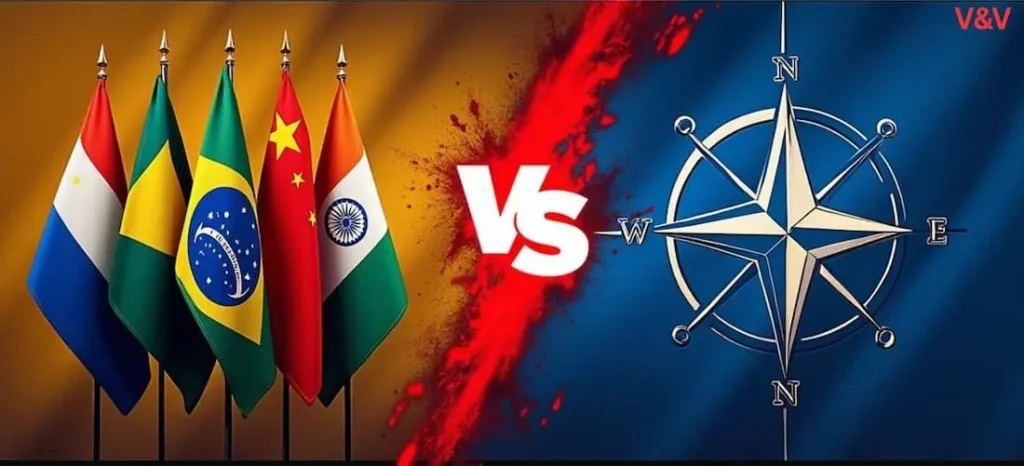NATO’s Secretary General Mark Rutte, on 16th July, has called out BRICS members, especially India, Brazil and China, over Russia. Rutte, under the pretext of NATO’s sanctions warning, pressured the three nations to compel Russia to either end the war or bear the brunt of secondary sanctions from the US themselves.
The NATO secretary-general made it abundantly clear that conducting business with Russia would have economic consequences for the nations. NATO’s latest meeting, post the US declaration of increasing the ammunition for Ukraine to aid in the war against Russia, clearly signals its biased agendas. NATO’s sanctions warning leaves a bitter aftertaste and risks straining the Western alliance’s relations with non-aligned nations.
The question then arises that NATO’s interest in ‘threatening’ the major countries of the global south is their idea of protecting democracy, or is it just usual ‘western exceptionalism’?
NATO’s Expanding Role From Military Pact To Economic Enforcer?
NATO (North Atlantic Treaty Organisation) was formed in 1949, as a military alliance in the backdrop of the Cold War. Mostly, North American and European countries are part of it. Clearly, the alliance is overstepping their mandate by interfering in the business and economic aspects by imposing the secondary sanctions on the nations that it can’t control directly.
Unfortunately for BRICS members, this is not the first time NATO (US, particularly) has outrightly tried to prove its dominance. In the past too, it has resorted to punitive measures to serve its own agenda. This is the classic case of economic coercion meets global diplomacy. The US has been dancing to this tune for quite a while now.
Since repeated ‘direct’ threats to Russia made absolutely no impact, NATO wants to ‘change the horse midstream’ by hinting at the secondary sanctions on China, Brazil and India to stop their trade relations with Russia. Basically, a new tactic to fund their anti-Russia campaign.
Using financial diplomacy for a military alliance such as NATO goes against its charter. It could perhaps welcome new rifts between the global north and south. If NATO is trying to mirror UN Security Council or WTO, then aren’t they crossing the threshold of their jurisdiction? A military alliance shouldn’t stoop to using economic coercion as a tool to persuade nations to ally with it.
Is NATO Equal US: Unpacking NATO’s Sanctions Warning and Russia’s Sanction Narrative
NATO is the front for US foreign policy because all decisions of NATO seem to be taken by one nation. There is no doubt that any war, and then be it the Russia and Ukraine war, must be condemned. The idea of it, however, coming from NATO (US in fancy suit), notorious for fueling countless wars, reeks of hypocrisy.
Rutte, subsequent to Trump’s declaration of imposing 100% tariffs on the countries which would buy Russian exports, said that the three BRICS nations would be heavily affected by US sanctions if they don’t persuade Putin to end the war.
Despite being the Secretary General for NATO, Rutte’s comment seemed to align more with Washington’s stance than a NATO consensus. But then, this is classic US, doing what it does best: firing from NATO’s shoulder. US is trying to give the pressure signal to the powerful nations of the Global South. They are yet again indulging in a modern way of cold war containment strategy. Instead of using the missiles, US is giving veiled threats in the form of sanctions. Not only could this rattle North-South dynamics, but ironically enough, it might just drive BRICS further into Russia’s corner, the exact opposite of what NATO wants.
Western Hypocrisy On Russian Trade: Why NATO’s Sanctions Warning Indicate Double Standards
Even someone new to the diplomatic world of geopolitics would know that US always manages to find new ways to promote their oil exports. Despite the loud anti-Russian trade rhetoric, the West has been silently continuing its trade with Russia.
Europe quietly kept buying Russian LNG (liquefied Natural gas) even after the Ukraine invasion. So, as long as the West or Europe is gaining something from a country, they claim to practice genocide, it’s alright because the global north has more rights to world resources!
Countries like Germany and France have had companies that maintained indirect ties or quietly exited months, even years later. It exposed the hypocritical side of NATO’s sanctions warning.
“Despite a range of sanctions and the threat posed by dependence on Russian energy, in the third year of Russia’s full-scale invasion of Ukraine, EU imports of Russian fossil fuels in particular remain largely unchanged. They totalled EUR 21.9 bn, a 6% year-on-year drop in value but merely a 1% year-on-year drop in volumes.”
To top it all, the US on numerous occasions have imported uranium used in their nuclear reactors from Russia. Although the dynamics shifted in 2024, after they imposed the ban on Russian uranium. The ban came along when the invasion was in its 3rd year, bringing Western double standards to the forefront.
The question still stands that if the West can selectively trade with Russia, why does it become a threat all of a sudden when the Global South does it? This selective treatment breeds resentment among countries instead of compliance and creates differences in the diplomatic world.
The Multipolar Reality of The Global South and Efforts to Push Back
India has maintained its commitment to ‘strategic autonomy’ by continuing to trade with Russia, despite the sanctions in the past. This policy prioritises India’s national interests and allows it to maintain relationships with multiple global powers. This includes both Russia and Western nations, without aligning with any particular bloc.
India has always held peace between nations in high regard. It is apparent in the way our foreign policy has been designed. Although India maintained neutrality, it still condemned the Russia-Ukraine war. The defence deals and oil trades, however, are India practicing strategic autonomy, looking out for itself in a diplomacy-dominated world.
China, on the other hand, would prove to be difficult for the US to manage from multiple fronts. The country has already survived the sanctions from the US in the past. China’s deepening ties with Russia have long unsettled the US, given that both nations possess the strength and the will to challenge American dominance.
Economically, Brazil sees BRICS as a platform to bypass Western financial dominance. For instance SWIFT or the dollar system, especially as the group pushes for alternative trade mechanisms. Unlike NATO, BRICS stands for economic perseverance and stability in the member nations. BRICS also focuses on the establishment of a multipolar world where power isn’t concentrated in the hands of the West.
Conclusion
The world has been changing rapidly, and the major factor is globalisation. Post 2010, the hegemony that US once enjoyed has slowly declined, especially after its spectacular failure in the Middle East. If persuading NATO and coercing the growing nations to do its bidding is America’s idea to maintain its relevance, then it is tone deaf in the current multipolar setup. While it is a necessity to condemn a war, the hypocrisy and coercion are not the way to do it, particularly if the warning is attacking the strategic autonomy of a nation. In this regard, then NATO’s sanctions warning is futile.
NATO’s growing pressure on non-member nations isn’t just overreach. It’s a test to see how long the West is going to make the global south dance to its tunes. So what do you think? Does NATO have the right to dictate economic choices to sovereign nations?
Also read: When will Kali arrive? The answer lies within.


Very well articulated.
Beautifully and critically represented all information
Can’t ignore the layers of hypocrisy here..well said!!